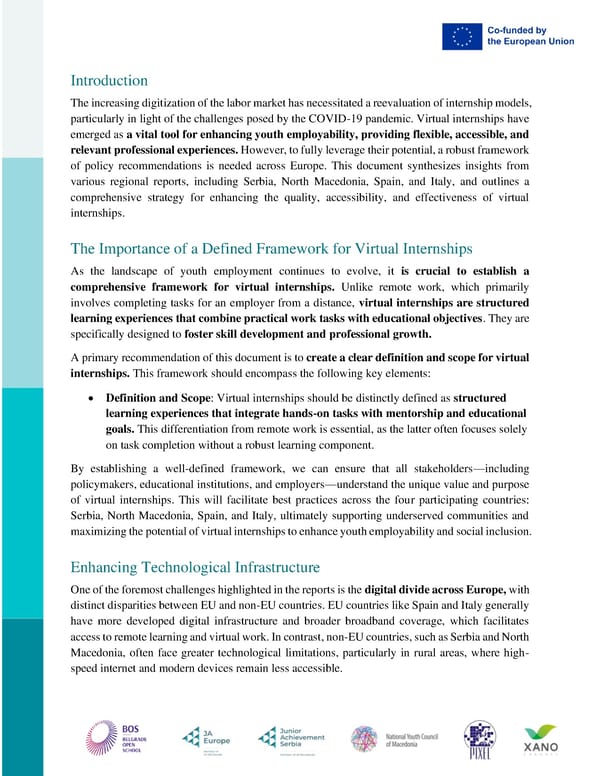Introduction The increasing digitization of the labor market has necessitated a reevaluation of internship models, particularly in light of the challenges posed by the COVID-19 pandemic. Virtual internships have emerged as a vital tool for enhancing youth employability, providing flexible, accessible, and relevant professional experiences. However, to fully leverage their potential, a robust framework of policy recommendations is needed across Europe. This document synthesizes insights from various regional reports, including Serbia, North Macedonia, Spain, and Italy, and outlines a comprehensive strategy for enhancing the quality, accessibility, and effectiveness of virtual internships. The Importance of a Defined Framework for Virtual Internships As the landscape of youth employment continues to evolve, it is crucial to establish a comprehensive framework for virtual internships. Unlike remote work, which primarily involves completing tasks for an employer from a distance, virtual internships are structured learning experiences that combine practical work tasks with educational objectives. They are specifically designed to foster skill development and professional growth. A primary recommendation of this document is to create a clear definition and scope for virtual internships. This framework should encompass the following key elements: • Definition and Scope: Virtual internships should be distinctly defined as structured learning experiences that integrate hands-on tasks with mentorship and educational goals. This differentiation from remote work is essential, as the latter often focuses solely on task completion without a robust learning component. By establishing a well-defined framework, we can ensure that all stakeholders—including policymakers, educational institutions, and employers—understand the unique value and purpose of virtual internships. This will facilitate best practices across the four participating countries: Serbia, North Macedonia, Spain, and Italy, ultimately supporting underserved communities and maximizing the potential of virtual internships to enhance youth employability and social inclusion. Enhancing Technological Infrastructure One of the foremost challenges highlighted in the reports is the digital divide across Europe, with distinct disparities between EU and non-EU countries. EU countries like Spain and Italy generally have more developed digital infrastructure and broader broadband coverage, which facilitates access to remote learning and virtual work. In contrast, non-EU countries, such as Serbia and North Macedonia, often face greater technological limitations, particularly in rural areas, where high- speed internet and modern devices remain less accessible.
 Policy Recommendations Page 4 Page 6
Policy Recommendations Page 4 Page 6